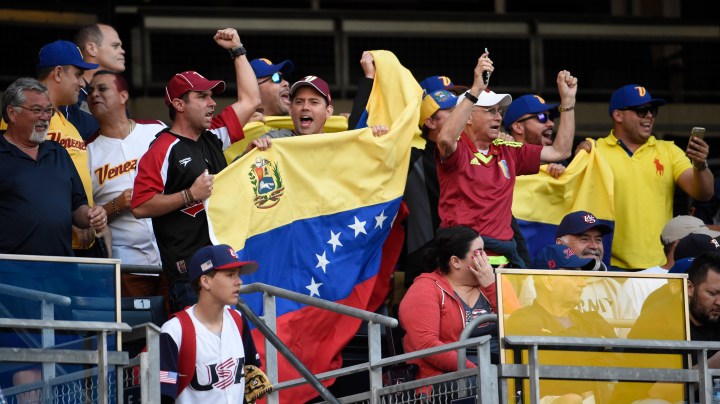Venezuela Citizens Complain After Government Spends $10 Million on Baseball Instead of Food

Venezuela fans cheer before the World Baseball Classic Pool F Game Two between Venezuela and the United States at PETCO Park on March 15, 2017. Photo by Denis Poroy/Getty Images
The Venezuelan baseball winter league is a yearly tradition that sees the country’s brightest stars come back home for a few months every year, giving fans a chance to get an up-close and personal look at Venezuela’s most prominent sporting exports. However, the winter league is not immune to the pressures of the outside world, and the beginning of the 2017-2018 season has already come up against the harsh reality of what has been a year of food shortages, record inflation, and mass demonstrations.
The government of Nicolás Maduro recently allocated $10 million for the winter league, mostly for importing equipment and paying player salaries. That decision has spurred a round of complaints from fans and, in a surprising move, from teams in the league, who are understandably upset that they are receiving preferential treatment while their countrymen are in need of medicine and supplies.
In a post since deleted but translated by Bloomberg News, executives at the Leones de Caracas–the most popular team in the country, and one that had a stadium crisis due to the political turmoil earlier this year–Tweeted out their opposition to the $10 million allocation: ““First we want dollars for medicine and food for the country, then, once the crisis is resolved, they can approve dollars for the league and events. We’ve all lost friends and family due to the lack of medicine. We love baseball profoundly, but Venezuela comes first.”
Former Caracas manager Alfredo Pedrique went further in June, stating that he believes there shouldn’t be baseball in Venezuela this season: “Take conscience, and support these Venezuelans that are sacrificing their lives for the freedom of Venezuela, for the benefit of everyone, give them super and take this decision to not have Venezuelan baseball this year,” he said in an interview with a Venezuelan radio station.
While the funds are at least being used internally–unlike the move by Maduro to offer the United States $5 million for Hurricane Harvey relief, which was met with anger at the funds not being used for Venezuela’s own political disaster, as well as floods that have struck parts of the country this summer–it’s unlikely that people will take kindly to the unpopular administration’s usage of funds that could be used for social good instead of baseball.
Bloomberg spoke to Carlos Lopez, a 22-year-old graduate from the capital, who summed up the tone-deafness of the allocation thusly: “I’m not capable of going to the stadium knowing that a good part of the show is being paid for by preferential dollars for entertainment when there are people in vital need of food and medicine.”
The allocation was announced by Venezuelan Vice President Tareck El Aissami, who presented it as a benefit to the people of the country: “The professional baseball season is assured for our people and all of the fans. May it be a high quality spectacle.” As millions face shortening food supplies and increasing unrest, El Aissami’s words may ring hollow to citizens just hoping to get through the current crisis.